Term Page
Crimes
Many noncitizen defendants are already deportable (“removable”). This includes all undocumented people, as well as lawful permanent residents (green card-holders) who have become deportable because of a conviction. If immigration authorities find these people – which is likely to happen – they will be deported unless they are granted some kind of immigration relief. For these defendants, staying eligible to apply for immigration relief is their most important immigration goal, and may be their highest priority in the criminal defense.
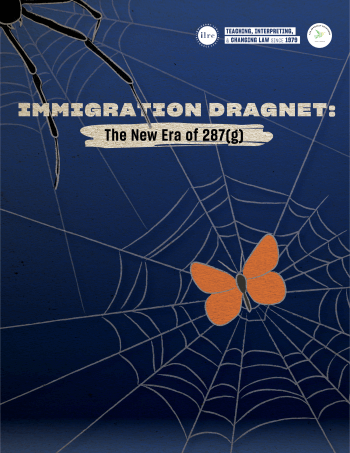
Section 287(g) of the Immigration and Nationality Act (“INA”) authorized the creation of a program that allows state and local law enforcement agencies to act as immigration enforcement agents.This policy brief reviews the recent history of 287(g) agreements and how they’ve proliferated, describes the three 287(g) agreement models, examines a case study of escalating 287(g) programs in Florida, delves into the programs’ dangers and harms, and provides some recommendations for local communities that want to stop 287(g) agreements in their tracks.
This advisory discusses the immigration consequences of a conviction for a controlled substance offense under California Prop 36, specifically Cal. H&S Code § 11395. This advisory explains the immigration consequences of a criminal plea to a Prop 36 controlled substance offense. It outlines criminal defense strategies for defenders to avoid these pleas and outlines removal defense strategies for immigration practitioners where the plea cannot be avoided.
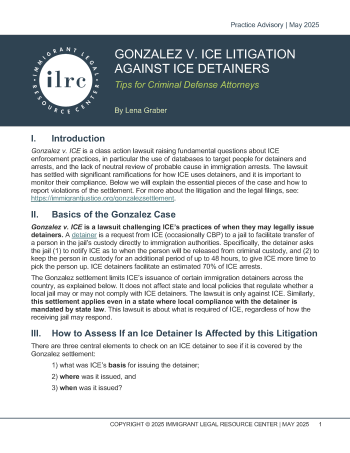
Step by step explanation for criminal defense counsel of how to identify ICE detainers that may be issued in violation of the Gonzalez v. ICE class action. This class action settlement applies nation-wide to limit ICE’s issuance of detainers. This advisory walks through the basics of the case and how to monitor and respond to any violations of the settlement.
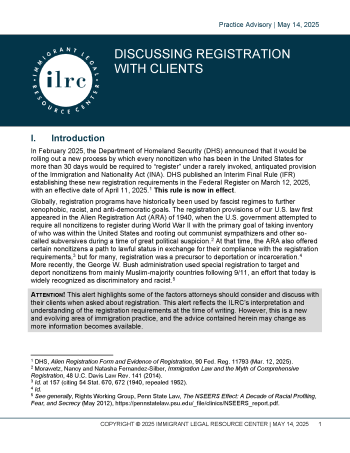
On April 11, 2025, the new Form G-325R took effect as a general tool to register all previously unregistered noncitizens under an antiquated and rarely invoked provision of the Immigration & Nationality Act, with criminal penalties for willful failure to register. This advisory was written to assist attorneys in discussing registration and the new Form G-325R with clients, including screening for prior registration and assessing the potential consequences of registering or not registering, so that individuals can make informed decisions about how to proceed in light of this new rule.
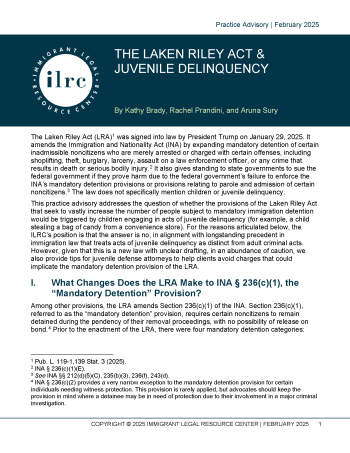
The Laken Riley Act (LRA) was signed into law by President Trump on January 29, 2025. It amends the Immigration and Nationality Act (INA) by expanding mandatory detention of certain inadmissible noncitizens who are merely arrested or charged with certain offenses. This practice advisory addresses the question of whether the provisions of the LRA that seek to vastly increase the number of people subject to mandatory immigration detention would be triggered by children engaging in acts of juvenile delinquency. In the advisory, we argue that the answer is no, in alignment with longstanding precedent in immigration law that treats acts of juvenile delinquency as distinct from adult criminal acts. However, given that this is a new law with unclear drafting, we also provide tips for juvenile defense attorneys to help clients avoid charges that could implicate the mandatory detention provision of the LRA.
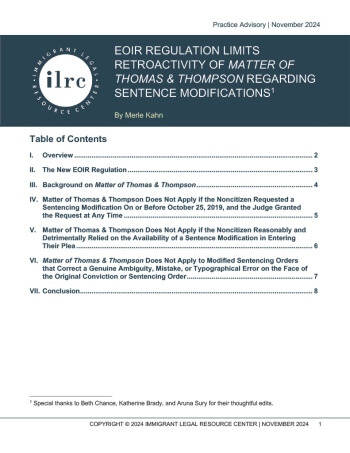
EOIR Regulation Limits Retroactivity of Matter of Thomas & Thompson Regarding Sentence Modifications
On October 25, 2019, the Attorney General published Matter of Thomas & Thompson holding that adjudicators could only recognize a sentence modification for immigration purposes where the sentence was vacated due to procedural or substantive defect as defined in Matter of Pickering. It was not clear whether this holding was retroactive. Under new DOJ regulations it is now clear that Matter of Thomas & Thompson is not retroactive. Adjudicators will recognize a sentence modification as vacating the sentence for immigration purposes where: (1) the person filed for the sentence modification on or before October 25, 2019; (2) the person relied on the availability to seek a sentence modification where the conviction date was on or before October 25, 2019; (3) there was a clerical or typographical error in the sentence regardless of the date of entry of the sentence; or (4) where the sentence was vacated due to a procedural or substantive defect in the sentencing - regardless of when the sentence modification was filed.
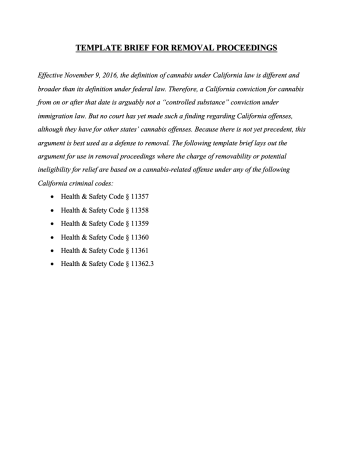
Since November 9, 2016, the definition of cannabis under California law is different and broader than the federal definition. Therefore, a California conviction for cannabis from on or after that date is arguably not a controlled substance conviction under federal immigration law. No court has yet made a finding on this issue for California offenses, but they have done so in other states with similar cannabis definitions. This template brief can be used to file a Motion to Terminate Proceedings or to file an Opposition to a Motion to Pretermit Proceedings (where the client is applying for adjustment of status or for cancellation of removal) to argue that any California cannabis conviction entered on or after November 9, 2016, is not a federal controlled substance offense.
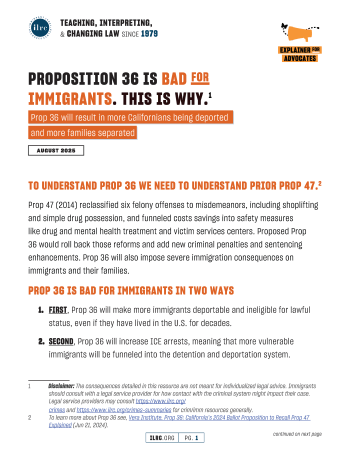
Prop 47 (2014) reclassified six felony offenses to misdemeanors, including shoplifting and simple drug possession, and funneled costs savings into safety measures like drug and mental health treatment and victim services centers. Proposed Prop 36 (November 2024) would roll back those reforms and add new criminal penalties and sentencing enhancements. Prop 36 will also impose severe immigration consequences on immigrants and their families. It will result in more Californians being deported and more families being separated. This resource provides some of the specific examples of the ways in which Proposition 36 will harm immigrants if passed.
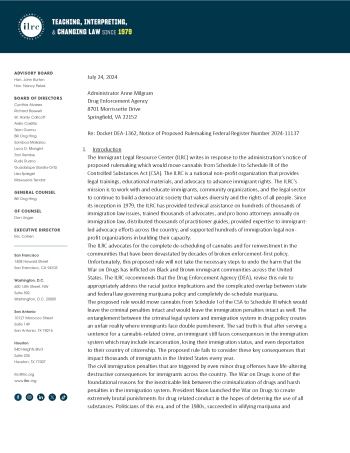
On July 23, 2024, the ILRC provide comment on the Biden Administration’s proposed re-scheduling of marijuana. The ILRC advocated for the complete de-scheduling of marijuana instead of rescheduling. The comment highlighted the racist impacts of maintaining marijuana on the schedule of controlled substances and the lack of any mitigating effect that rescheduling will have on immigration consequences of marijuana-related crimes